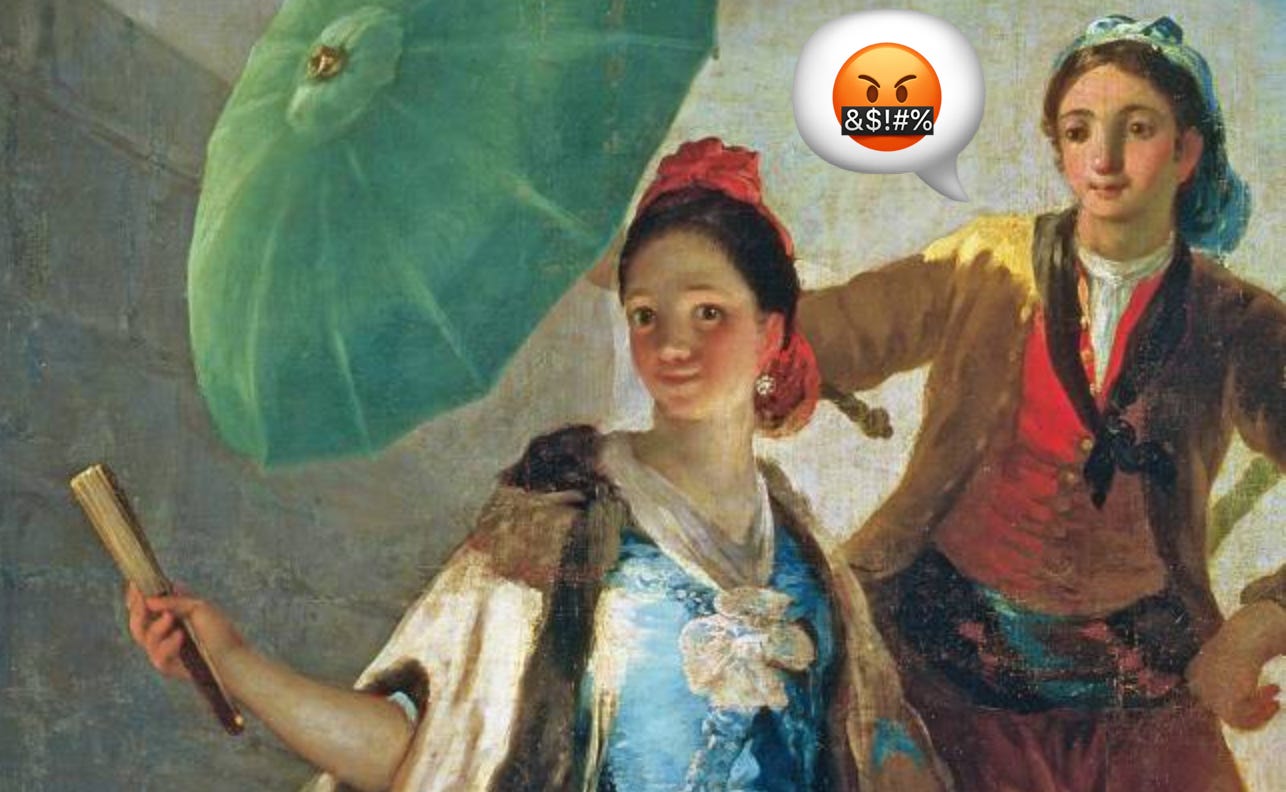The Wit’s Guide to Umbrage
Or, catching shade

The problem with umbrage is that it’s a one-way street: Everybody takes it but no one’s giving it. To wit, there are 388 examples revealed by a search for taking umbrage in the New York Times, but only four times in the newspaper’s records that umbrage has been given, the most recent being in 1864. That turns it into your problem, not mine, suggesting that anything that offends you is, as the kids say, an issue, not an ish-me.
“Nothing reveals a man’s character better than the kind of joke at which he takes offense.”
— G.C. Lichtenberg
Though all skins are not created equally thick, we’re decisively in the era of “I was just swinging my fists around and your nose got in the way.” The effects are everywhere apparent and the source is well explained in Ben Lerner’s book The Topeka School, in which the poet recalls high-school debating strategies honed in the 1990s. It was all about “committing the plausibly deniable outrage, then taking tactical umbrage, claiming the high ground.” The strategies of the troll, in charming analog form.
“You must never insult people in your own house — always go to theirs.”
— Myrtle Reed
To return to that simpler era of umbrage, consider the title of a 1985 collection of letters to the editor of The Globe and Mail newspaper: Shocked and Appalled. That classic cliché of reader correspondence was celebrated for what it was: A sign of tremendous loyalty. As editor Norman Webster wrote in the book’s foreword, readers “hold to the splendid notion that their paper belongs not to its owners or editors but to them, and they take their responsibilities very seriously.” In those days, the trolls were also the bridge keepers.
“TO HELL WITH YOU. OFFENSIVE LETTER FOLLOWS.”
— Angry telegram purportedly received by Sir Alec Douglas-Home
And though those letter writers had plenty to criticize in any given newspaper, it was at least a finite package of typos, inaccuracies, and booboos. There’s a great apocryphal tale of a copy editor being told that a foreign country had taken umbrage. He knew this was important, even though he couldn’t locate umbrage on a map. This gentle soul prepared a headline for the next day’s paper: “Umbrage Captured; Defenders Retreat in Disarray.”
“I said I didn’t think Chevy Chase could ad-lib a fart after a baked-bean dinner. I think he took umbrage at that a little bit.”
— Johnny Carson
Wonderfully, the meaning of umbrage has come full circle. The word comes from the Latin for shade, and back in the Victorian era you could still find people talking about the umbrage cast by foliage. Then, in 1980s drag culture, the actual word shade was given a new meaning. “Shade is I don’t tell you you’re ugly but I don’t have to tell you because you know you’re ugly,” performer Dorian Corey explains in the documentary Paris is Burning, “and that’s shade.”
“To apologize is to lay the foundation for a future offense.”
— Ambrose Bierce
And so the Second Law of Interpersonal Dynamics holds: Outrage can neither be created nor destroyed. You (well, maybe not you) can very definitely throw shade, I (well, maybe not me) can take umbrage. It’s a give and take that keeps us all from getting a sunburn.

Welcome to May! This month I’m pleased to welcome the artist Sarah Farquhar as our resident Riposte Cardist. The Toronto illustrator has chosen to interpret this homegrown gem, which originally appeared in the novel Surfacing:
“Stupidity is the same as evil if you judge by the results.”
— Margaret Atwood
I’ll share Farquhar’s riff on that line in this space next week. In the meantime, upgrade to a paid subscription to get Riposte Cards in the mail!
“A puritan’s a person who pours righteous indignation into the wrong things.”
— G.K. Chesterton
It’s important to only ever be upset about the correct things. But which things, exactly? Perhaps one of next week’s subjects?
If you must take issue, take Issue No. 305 of Get Wit Quick. It neither took nor gave offense, instead existing in some liminal state between the two. As scientists remind us, “all things being equal” is a nonchalant way to refer to the heat death of the universe. The newsletter’s mascot is a magpie named Magnus after the magician in Robertson Davies’ Deptford Trilogy. The title font is Vulf Sans, the official typeface of the band Vulfpeck, which was modelled after IBM Selectric typewriters. The book was Elements of Wit: Mastering The Art of Being Interesting. Leave some umbrage by tapping the ❤️ below.





I read "Shocked and Appalled" at the time and remember with pleasure the letter from the subscriber who wondered why his letter to the editor had not been published in full. He concluded that portions of it " had been lost in the mail."
My first and needed laugh out loud today. "There’s a great apocryphal tale of a copy editor being told that a foreign country had taken umbrage. He knew this was important, even though he couldn’t locate umbrage on a map. This gentle soul prepared a headline for the next day’s paper: “Umbrage Captured; Defenders Retreat in Disarray.” Thanks!